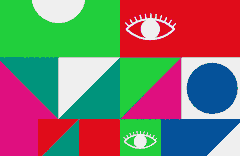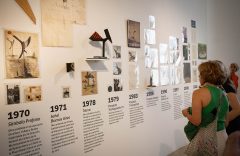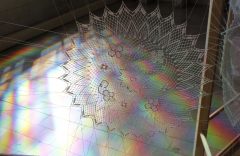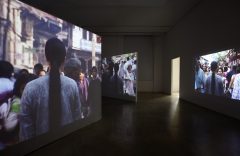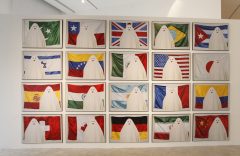
Curators, artists, researchers and special guests star in a cycle of virtual talks about the themes that cross the different axes of research of the exhibition curated by the French linguist Barbara Cassin (Académie Française/CNRS) and researchers from the Dr. Norberto Griffa Research Institute in Art and Culture at UNTREF, Marina Aguerre and Leandro Martínez Depietri.
Online workshops and concerts will also take place.
From April 23 to July 2, every Friday at 6:00 p.m. on the YouTube channel of the National University of Tres de Febrero and at the MUNTREF website. Free of charge – No prior registration.
“After Babel. Translations from the Rio de la Plata” is an exhibition of the MUNTREF Center of Contemporary Art carried out together with the IIAC-UNTREF in co-production with the Institut Français d’Argentine, the Ambassade de France in Argentine, the Alliance Française Buenos Aires and the Organization Internationale de la Francophonie with the support of Translitterae.
Opening conversation: (special day) Thursday, April 22
Translation as the basis for contemporary citizenship
Participants: Diana Wechsler, Barbara Cassin, Marina Aguerre and Leandro Martínez Depietri
The conversation between MUNTREF’s artistic direction and the curators of the exhibition addresses the foundations of “After Babel”, developing its main axes from the question of the value of translation in the globalized world and its power as a basis for a citizen construction. What relationships between aesthetics and politics does translation enable? What approaches does translation provide for a different understanding of contemporary art and the cultural intersections that take shape in its practices?
Friday 04/23
Translation problems, paving the way between local nationalisms and global hegemonies in tension
Participants: Fabiana Serviddio, doctor in History and Theory of the Arts and researcher (UNTREF-CONICET) and Diego Bentivegna, doctor of Letters, researcher (UNTREF-CONICET), director of the Latin American Observatory of Glotopolitics.
Moderated by: Leandro Martínez Depietri, researcher (IIAC / UNTREF), curator of the “After Babel” exhibition.
In times of suspended globalization, this table addresses translation as an alternative that highlights differences as opposed to the overwhelming hegemony of Globish (or Global English) as Barbara Cassin has called it. The discussion delves into the relationships between dominant languages, geopolitical hierarchies and the construction of canons and aesthetic discourses in the Global North. From a situated perspective, we will focus on Argentina to discuss a larger network of international relations.
Friday 05/07
The languages under “the” language
Participants: Santiago Durante, specialist in ethnolinguistics, culture and literature of native peoples (UBA-UNAHUR) and Hugo Vidal, artist, member of the exhibition “After Babel”.
Moderated by: Leandro Martínez Depietri, researcher (IIAC / UNTREF), curator of the “After Babel” exhibition.
How to make the cultural diversity of the Argentine territory visible through its languages? What links can contemporary artistic practices build?
A conversation about the networks of speakers that were part of Vidal’s translation project for the exhibition that will address the vitality of the original languages in Argentina, their role in the indigenous re-emergence processes of the last decades and the power of the networks of affection in the development of cultural recovery projects.
Friday 05/14
Why Babel?
Participants: artists Sebastián Tedesco and Eduardo Médici.
Moderated by: Marina Aguerre, researcher (IIAC / UNTREF), curator of the exhibition “After Babel”.
Why Babel… today? What symbolic weight does this atavistic symbol of Western culture carry? What are the reasons why it continues to be a recurring figure in the visual arts?
By beginning with a dialogue between artists, we investigate the sustained presence of the famous tower in Western visuality from a critical perspective that questions the contemporary view of cultural diversity symbolized in the confusion of languages.
Friday 05/21
“Simultaneous translation”, performance lecture by Sofía Medici
Projection of and debate on the work.
“Simultaneous translation” is a performative reading that narrates and illustrates the research process to carry out a performance and the failed ideas in relation to its representation. The reading starts from a definition found in Wikipedia on the “House of Tucumán”, it conceives processions in the city, karaokes and interventions, and culminates with a paradoxical translation of the Act of Independence from Quechua to Spanish.
Participants: Sofía Medici, artist, Leandro Martínez Depietri, researcher (IIAC-UNTREF).
Friday 05/28
The limits of language
Participants: Leandro Katz, artist; Carolina Jozami, curator (MNBA) and Daniela Hermosilla Zúñiga, Art historian (University of Barcelona).
Moderators: Marina Aguerre (IIAC-UNTREF) and Leandro Martínez Depietri (IIAC-UNTREF)
As conceptualisms developed in Argentina during the convulsed decades of the 1960s and 1970s, marked by two bloody dictatorships and the escalation of social violence, questions about the politics of communication and language furrow the production of various Argentine artists, which go through experiences of exile, censorship and political persecution. This is how they appear in the work of Leandro Katz, Margarita Paksa, Edgardo Vigo, Mirtha Dermisache and León Ferrari inquiries about invented alphabets and graphics, asemic and in-code writings.
The conversation on Friday 28 will dialogue with León Ferrari’s exhibition at the National Museum of Fine Arts.
Friday, June 4
Policies of translation, editorial policies
During the publishing boom that began in Buenos Aires after the rise of Franco’s rule in Spain, publishers with clear aesthetic and ideological profiles that dispute the cultural field appeared. This dialogue takes up the editorial and translation policies as ways of cultural intervention from the analysis of two publishing houses in Buenos Aires: SUR and Santiago Rueda. The first developed under the direction of Victoria Ocampo, national reference of literary modernity, and the second, of Santiago Rueda. Two different regards meet in this encounter that puts in value the work of distinctive personalities from the literary field of the twentieth century.
Participants: Ernesto Montequin (UNESCO Observatory at Villa Ocampo) and José Luis de Diego (UNLP).
Moderator: Marina Aguerre (IIAC-UNTREF), curator of the exhibition.
Friday, June 18
The sign in the flesh
How does language inscribe itself in the body? Which signs does it leave behind? Can we think of the body as a translation instrument?
Signs, words, movement and moving image will take part in the discussion with visual and scenic artists, specifically on the production of video works, the varieties of body language, and the untranslatable remnant of gestural communication.
Dissertants: Nicolás Martella (artist), Lihuel González (artist) and Silvio Lang (stage director)
Moderator: Leandro Martínez Depietri (IIAC – UNTREF)
Friday, June 25
Translation or death
Revisiting the dichotomy between civilization and barbarism and its importance in Argentine history starting from the role of Spanish as a language of domination, this will be a conversation that shall open questions about language as a vehicle of racialization, on Spanish as a technology of state domination, and on the new narratives that are beginning to discuss the common linguistic sense in line with processes of indigenous reemergence.
Dissertants: Cristina Piffer (Artist) and Verónica Azpiroz Cleñan (Political Scientist, member of the Mapuche Community Epu Lafken and of the Collective for the Human Right to Communication)
Moderator: Marina Aguerre (IIAC – UNTREF Researcher)
Friday, July 2nd
Translation and syncretism
The problem of the translation of ideas, beliefs and practices between cultures during early Modernity emerges as a central theme when we address the processes of conquest and evangelization of the American continent in the light of the different expressions taken by the artistic manifestations. In this sense, this upcoming conversation between art historians will address the way in which books, prints, paintings, sculptures and other objects contributed to this dynamic of transformation and creation of new meanings in South American during the Colonial Period.
Dissertants: Leontina Etchelecu (Saavedra Historical Museum), Gabriela Siracusano (Materia Center/IIAC-UNTREF) and Agustina Rodríguez Romero (Materia Center/IIAC-UNTREF)
Moderator: Marina Aguerre (IIAC – UNTREF)
News
